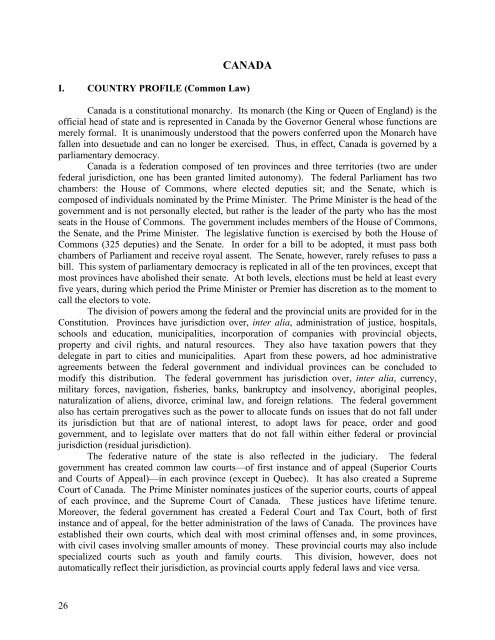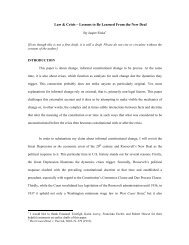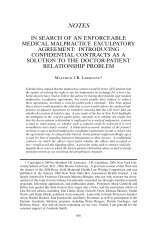Guide to Foreign and International Legal Citations - New York ...
Guide to Foreign and International Legal Citations - New York ...
Guide to Foreign and International Legal Citations - New York ...
Create successful ePaper yourself
Turn your PDF publications into a flip-book with our unique Google optimized e-Paper software.
26<br />
CANADA<br />
I. COUNTRY PROFILE (Common Law)<br />
Canada is a constitutional monarchy. Its monarch (the King or Queen of Engl<strong>and</strong>) is the<br />
official head of state <strong>and</strong> is represented in Canada by the Governor General whose functions are<br />
merely formal. It is unanimously unders<strong>to</strong>od that the powers conferred upon the Monarch have<br />
fallen in<strong>to</strong> desuetude <strong>and</strong> can no longer be exercised. Thus, in effect, Canada is governed by a<br />
parliamentary democracy.<br />
Canada is a federation composed of ten provinces <strong>and</strong> three terri<strong>to</strong>ries (two are under<br />
federal jurisdiction, one has been granted limited au<strong>to</strong>nomy). The federal Parliament has two<br />
chambers: the House of Commons, where elected deputies sit; <strong>and</strong> the Senate, which is<br />
composed of individuals nominated by the Prime Minister. The Prime Minister is the head of the<br />
government <strong>and</strong> is not personally elected, but rather is the leader of the party who has the most<br />
seats in the House of Commons. The government includes members of the House of Commons,<br />
the Senate, <strong>and</strong> the Prime Minister. The legislative function is exercised by both the House of<br />
Commons (325 deputies) <strong>and</strong> the Senate. In order for a bill <strong>to</strong> be adopted, it must pass both<br />
chambers of Parliament <strong>and</strong> receive royal assent. The Senate, however, rarely refuses <strong>to</strong> pass a<br />
bill. This system of parliamentary democracy is replicated in all of the ten provinces, except that<br />
most provinces have abolished their senate. At both levels, elections must be held at least every<br />
five years, during which period the Prime Minister or Premier has discretion as <strong>to</strong> the moment <strong>to</strong><br />
call the elec<strong>to</strong>rs <strong>to</strong> vote.<br />
The division of powers among the federal <strong>and</strong> the provincial units are provided for in the<br />
Constitution. Provinces have jurisdiction over, inter alia, administration of justice, hospitals,<br />
schools <strong>and</strong> education, municipalities, incorporation of companies with provincial objects,<br />
property <strong>and</strong> civil rights, <strong>and</strong> natural resources. They also have taxation powers that they<br />
delegate in part <strong>to</strong> cities <strong>and</strong> municipalities. Apart from these powers, ad hoc administrative<br />
agreements between the federal government <strong>and</strong> individual provinces can be concluded <strong>to</strong><br />
modify this distribution. The federal government has jurisdiction over, inter alia, currency,<br />
military forces, navigation, fisheries, banks, bankruptcy <strong>and</strong> insolvency, aboriginal peoples,<br />
naturalization of aliens, divorce, criminal law, <strong>and</strong> foreign relations. The federal government<br />
also has certain prerogatives such as the power <strong>to</strong> allocate funds on issues that do not fall under<br />
its jurisdiction but that are of national interest, <strong>to</strong> adopt laws for peace, order <strong>and</strong> good<br />
government, <strong>and</strong> <strong>to</strong> legislate over matters that do not fall within either federal or provincial<br />
jurisdiction (residual jurisdiction).<br />
The federative nature of the state is also reflected in the judiciary. The federal<br />
government has created common law courts—of first instance <strong>and</strong> of appeal (Superior Courts<br />
<strong>and</strong> Courts of Appeal)—in each province (except in Quebec). It has also created a Supreme<br />
Court of Canada. The Prime Minister nominates justices of the superior courts, courts of appeal<br />
of each province, <strong>and</strong> the Supreme Court of Canada. These justices have lifetime tenure.<br />
Moreover, the federal government has created a Federal Court <strong>and</strong> Tax Court, both of first<br />
instance <strong>and</strong> of appeal, for the better administration of the laws of Canada. The provinces have<br />
established their own courts, which deal with most criminal offenses <strong>and</strong>, in some provinces,<br />
with civil cases involving smaller amounts of money. These provincial courts may also include<br />
specialized courts such as youth <strong>and</strong> family courts. This division, however, does not<br />
au<strong>to</strong>matically reflect their jurisdiction, as provincial courts apply federal laws <strong>and</strong> vice versa.
















